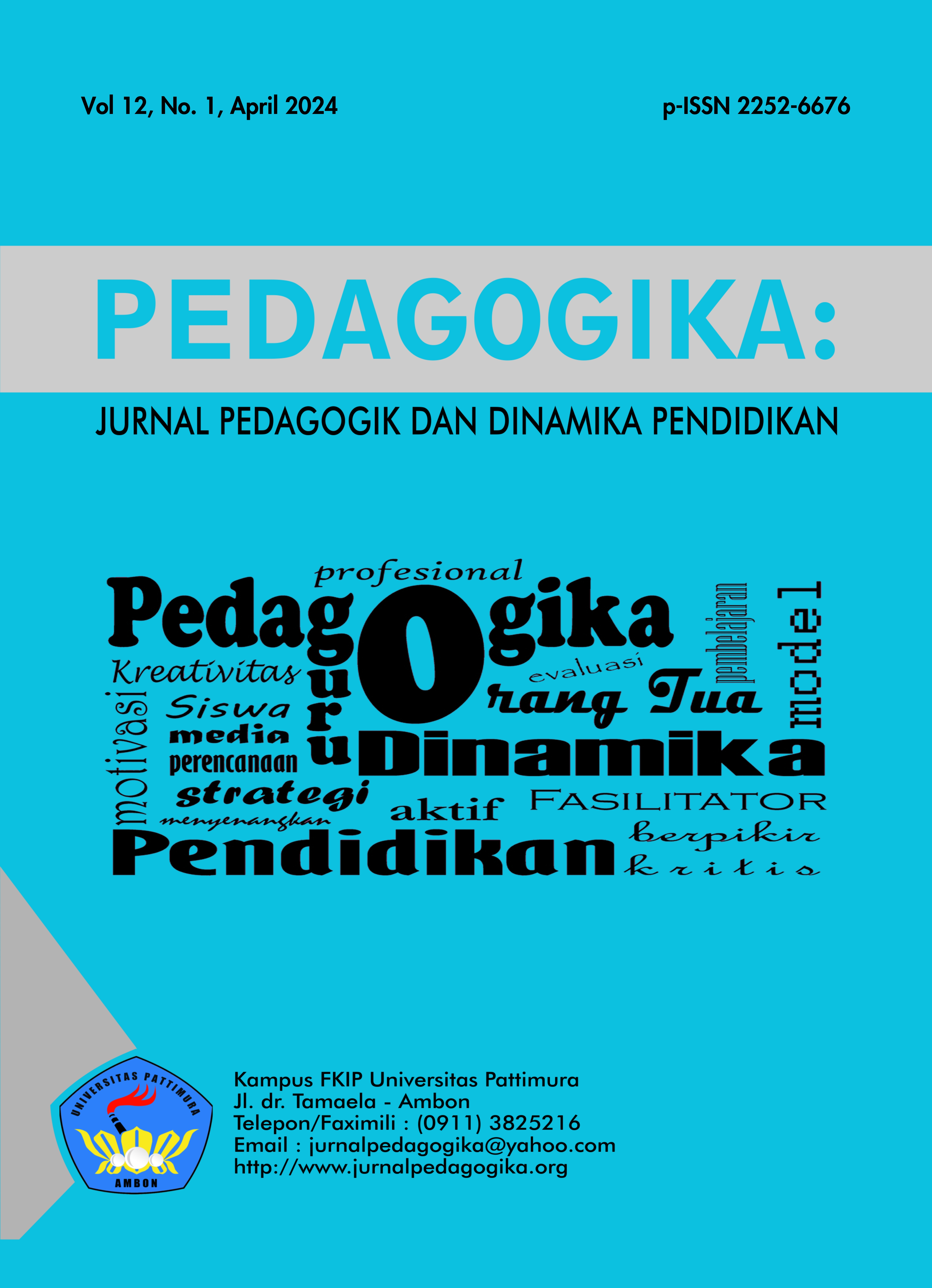MANAJEMEN PENDIDIKAN MANAJEMEN PENDIDIKAN MASA DEPAN BERBASIS KEDAMAIAN DI SMP NEGERI 2 SENTANI
Abstract
This study analyzes the implementation of peace education at Junior High School 2 Sentani and its impact on peace-based education management. Through a qualitative approach, data were collected through surveys, interviews and analysis of school documents. The results show that this school successfully integrates peace values in the lesson plans of several subjects and utilizes the Merdeka Curriculum to support the dimension of peace values. Teachers actively teach peace values through strategies such as the “Bestie Day” program and successfully overcome conflicts between schools and teach peace values. Measuring the integration of peace values in lesson plans and monitoring student character are used to measure peace-based education management. Peace education creates a harmonious school environment and peace-loving student characters, with positive impacts on society. The importance of a positive school climate and the role of teachers in shaping students' peaceful character. Teaching mutual understanding also helps create a harmonious environment and students' social skills. Thus, investing in peace education is a progressive step towards shaping students' character, creating a peaceful school environment and making a positive contribution to society. The implementation of peace education at the Junior High School 2 Sentani is an important step in the development of peace-based education management.
Downloads
References
Al Mushaiqri, M. R., Ishak, Z. Bin, & Ismail, W. M. (2021). Effects of the Peace Education Program on the Social and Emotional Behaviour for Pre-School in the Sultanate of Oman. Education in Childhood, 57.
Ardizzone, L. (2001). Towards global understanding: The transformative role of peace education. Current Issues in Comparative Education, 4(1), 1–10.
Brand, S., Felner, R., Shim, M., Seitsinger, A., & Dumas, T. (2003). Middle School Improvement and Reform: Development and Validation of a School-Level Assessment of Climate, Cultural Pluralism, and School Safety. Journal of Educational Psychology, 95(3), 570.
Buchori, S., & Fakhri, N. (2018). Nilai-Nilai Kedamaian Dalam Perspektif Suku Bugis dan Makassar. JOMSIGN: Journal of Multicultural Studies in Guidance and Counseling, 2(1), 61–72.
Cavanagh, T. (2009). Creating a new discourse of peace in schools: Restorative justice in education. Journal for Peace and Justice Studies, 18(1/2), 62–85.
Darmawan, I. P. A. (2019). Pendidikan Perdamaian Dengan 12 Nilai Dasar Perdamaian. BIA’: Jurnal Teologi Dan Pendidikan Kristen Kontekstual, 2(1). https://doi.org/10.34307/b.v2i1.82
Dasar, D. S. (2022). Kenali Bentuk Kekerasan di Sekolah Beserta Solusinya. https://ditpsd.kemdikbud.go.id/artikel/detail/yuk-kenali-bentuk-kekerasan-di-sekolah-beserta-solusinya#:~:text=Untuk di satuan pendidikan%2C berdasarkan,334 dan anak perempuan 383.
Davies, L. (2009). Educating against Extremism. Trentham Books.
Djamal, M. (2016). Fenomena Kekerasan di Sekolah. Pustaka Pelajar.
Erviana, V. Y. (2021). Penanganan Dekadensi Moral melalui Penerapan Karakter Cinta Damai dan Nasionalisme. Jurnal Penelitian Ilmu Pendidikan, 14(1). https://doi.org/10.21831/jpipfip.v14i1.27149
Fakhri, N. (2022). Strategi Pendidikan Kedamaian pada Sekolah di Indonesia. Indonesian Journal of Learning Education and Counseling, 5(1), 69–80.
Hergianasari, P. (2019). Konsep Deradikalisasi Pada Pendidikan Berbasis Pembelajaran Terpadu. Scholaria: Jurnal Pendidikan Dan Kebudayaan, 9(3). https://doi.org/10.24246/j.js.2019.v9.i3.p239-244
Hicks, D. (1988). Education for Peace: Issues, Principles, and Practice in the Classroom. Taylor & Francis.
Hikmah, A. N., & Amriyati, U. (2017). Analisis Hubungan Hasil Belajar Dengan Karakter Cinta Damai di SMP Negeri 2 Muaro Jambi. Jurnal Pendidikan Matematika Dan Sains, 4(1), 1–6.
Johnson, D. W. J. and R. T. (2005). Essential Components of Peace Education. Theory into Practice, 44(4), 280–292.
KPAI. (2022). Catatan Pelanggaran Hak Anak Tahun 2021 dan Proyeksi Pengawasan Penyelenggaraan Perlindungan Anak Tahun 2022. https://www.kpai.go.id/publikasi/catatan-pelanggaran-hak-anak-tahun-2021-dan-proyeksi-pengawasan-penyelenggaraan-perlindungan-anak-tahun-2022
Lewsader, J., & Myers-Walls, J. A. (2017). Developmentally Appropriate Peace Education Curricula. Journal of Peace Education, 14(1). https://doi.org/10.1080/17400201.2016.1228527
Loukas, A., Suzuki, R., & Horton, K. D. (2006). Examining School Connectedness as a Mediator of School Climate Effects. Journal of Research on Adolescence, 16(3). https://doi.org/10.1111/j.1532-7795.2006.00504.x
Nugroho, O. H. P. (2014). Meretas Damai Di Tengah Keberagaman: Mengembangkan Pendidikan Kristiani Untuk Perdamaian Dalam Perspektif Multikulturalisme. Gema Teologi, 38(2).
Nurwanto, N., & Habiby, W. N. (2020). Penyemaian Sikap Hidup Damai di Sekolah: Tinjauan Pendidikan Perdamaian dan Multi-Dimensi Kurikulum. Scholaria: Jurnal Pendidikan Dan Kebudayaan, 10(1), 1–11.
Panggalo, I. S., & Palimbong, S. M. (2023). Sosialisasi Kesehatan Mental “Stop Bullying” di SD Negeri 243 Inpres Tampo Kelurahan Tampo Makale. Jurnal Kabar Masyarakat, 1(1), 25–28.
Puspa, A. (2021). 12.938 Anak Jadi Korban, KPPPA Soroti Kasus Kekerasan di Sekolah. https://mediaindonesia.com/humaniora/449122/12938-anak-jadi-korban-kpppa-soroti-kasus-kekerasan-di-sekolah
Sagala, S. (2000). Administrasi Pendidikan Kontemporer. Alfabeta.
Saputra, W. N. E. (2016). Pendidikan Kedamaian: Peluang Penerapan Pada Pendidikan Tingkat Dasar Di Indonesia. Jurnal CARE (Children Advisory Research and Education), 3(3), 88–94.
Sewang, A. (2015). Manajemen Pendidikan. Wineka Media.
Sihidi, I. T., & Amirudin, Z. (2022). Anti-Bullying Campaign at the Mambaus Sholihin Islamic Boarding School 2 Blitar. Community Empowerment, 7(3). https://doi.org/10.31603/ce.5788
Soter, I. K. (2019). Manajemen Pendidikan Berorientasi Masa Depan. Bawi Ayah: Jurnal Pendidikan Agama Dan Budaya Hindu, 9(2). https://doi.org/10.33363/ba.v9i2.271
Supraptiningrum, S., & Agustini, A. (2015). Membangun Karakter Siswa Melalui Budaya Sekolah di Sekolah Dasar. Jurnal Pendidikan Karakter, 6(2).
Umar, M. (2017). Internalisasi Nilai Kedamaian melalui Pendidikan Kedamaian sebagai Penguatan Pembangunan Karakter pada Masyarakat Heterogen. Waskita: Jurnal Pendidikan Nilai Dan Pembangunan Karakter, 1(1), 77–98.
Welsh, W. N. (2000). The Effects of School Climate on School Disorder. The Annals of the American Academy of Political and Social Science, 567(1), 88–107.
Wulandari, T. (2010). Menciptakan Perdamaian Melalui Pendidikan Perdamaian di Sekolah. Mozaik, 5(1), 68–83.
Copyright (c) 2024 PEDAGOGIKA: Jurnal Pedagogik dan Dinamika Pendidikan

This work is licensed under a Creative Commons Attribution-NonCommercial-ShareAlike 4.0 International License.









 This work is licensed under
This work is licensed under 